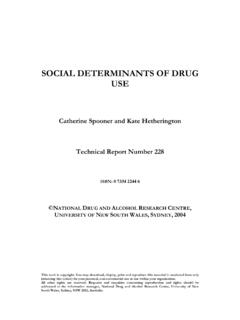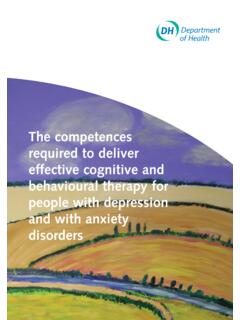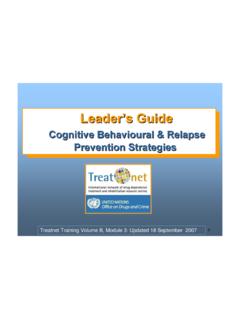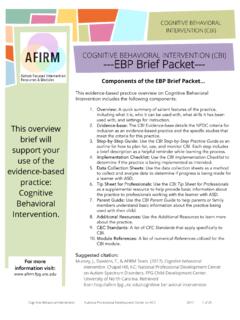Transcription of A brief cognitive-behavioural intervention for cannabis ...
1 A brief cognitive - behavioural intervention for cannabis dependence: Therapists' treatment manual Therapists' treatment manual Vaughan Rees, Jan Copeland and Wendy Swift Vaughan Rees, Jan Copeland and Wendy Swift NDARC Technical Report No. 64 NDARC Technical Report No. 64 A brief cognitive - behavioural intervention for cannabis dependence: A brief cognitive - behavioural intervention FOR cannabis DEPENDENCE: THERAPISTS' TREATMENT MANUAL Vaughan Rees, Jan Copeland & Wendy Swift National Drug and Alcohol Research Centre University of New South Wales Sydney NSW 2052 ISBN.
2 0 7334 0472 3 1998 National Drug and Alcohol Research Centre Not to be reproduced without permission of the authors iA brief cognitive - behavioural intervention for cannabis dependence: Therapists' treatment manual TABLE OF CONTENTS 1. INTRODUCTION .. cognitive -BEHAVIOUR THERAPY: AN OVERVIEW 1 cannabis 2 Forms of cannabis .. 2 Methods of use of 3 cannabis 3 Health and psychological effects of cannabis abuse .. 6 cannabis treatment research .. 6 2.
3 intervention PROTOCOL .. 8 Format of therapy .. 8 Timing and length of intervention .. 8 Inclusion and Exclusion Criteria .. 9 Assessment 10 Classification of treatment dropouts .. 11 3. GUIDELINES FOR DELIVERY OF cognitive behavioural TREATMENT PROGRAMME .. 12 SESSION 1 Setting the scene & introduction to motivational enhancement training Ground rules & outline of 12 Feedback from assessment: Profile of cannabis use pattern .. 13 Motivational enhancement 14 Setting goals.
4 16 Introduction to behavioural self monitoring: .. 17 SESSION 2: Planning to Quit 18 Review of the week and homework 18 Review of personal triggers and high risk 18 Introduction to coping with urges .. 18 Planning to 21 Information and discussion of withdrawal symptoms. 21 Examine social support systems .. 22 Dealing with slips or lapses .. 23 Optional section: Drug refusal 23 Concluding: Goals and Homework .. 24 SESSION Managing Withdrawal and cognitive Restructuring 25 Review of the previous week.
5 25 Reviewing withdrawal symptoms: .. 26 cognitive restructuring: cognitive issues in quitting 26 Ending the 29 SESSION 4: .. Review of cognitive Strategies and Skills Enhancement 30 Review of previous week .. 30 Development of Personal Skills ..31 i) Problem solving 31 ii) Management of 32 iii) Progressive Muscle 34 SESSION 5 and consolidating. Introduction to new skills if required Review of previous week .. 36 Coping skills 36 i) Assertiveness 36 ii) Communication 37 iii) Stress/anger 37 Concluding the session.
6 38 SESSION 6: Relapse Prevention and Lifestyle Modification .. 39 Overview of previous week's 39 Relapse prevention: main ideas to be 39 Looking to the 43 After the therapy has ended .. 43 4. REFERENCES .. 45 5. 48 iii iv Acknowledgments The authors would like to acknowledge the Research into Drug Abuse Grants Scheme of the Commonwealth Department of Health and Family Services for providing funding for the research from which this manual was developed.
7 The support and assistance of our colleagues, Professor Roger Roffman, School of Social Work, University of Washington, Seattle, and Dr Robert Stephens, Department of Psychology, Virginia Polytechnic Institute and State University, Blackburg, Virginia, is also gratefully acknowledged. We would also like to thank Etty Matalon and Sally Tomkins: the psychologists who worked on the treatment program and assisted not only with their extensive clinical expertise, but with many helpful suggestions and insights. Their contribution has been invaluable to the conduct of this research.
8 11. INTRODUCTION cognitive -BEHAVIOUR THERAPY: AN OVERVIEW cognitive -behaviour therapy (CBT) is a general psychological therapeutic technique which was designed to promote more-or-less permanent behaviour change by assisting clients to develop and use specific skills or techniques to overcome a psychological disorder. This approach has been used in the treatment of a wide range of psychological disorders, and was developed from a merging of behaviour therapy in the 1960s and cognitive therapy in the 1970s. From its beginning as a therapy for mood and anxiety disorders, CBT has developed into a multi-purpose therapy, which, among its many applications, has been found to be particularly effective in the management of substance abuse disorders.
9 CBT is an empirically-based therapy, which works on the premise that cognitions and behaviours are often intrinsically linked. Learning strategies to modify or manage both cognitions and their associated behaviours should yield results that are greater than the effect of targeting one of them alone. Substance abuse disorders, like many psychological disorders, are partly the result of faulty or irrational thought processes that have their manifestation in dysfunctional behaviours, such as drug taking. Many such thoughts are automatic, habitual and resistant to change.
10 The development of techniques to change or challenge such thought processes, together with other cognitive and behavioural coping responses, can lead to a reduction in an individual's dependence on a drug. Thus, CBT is a skills-based approach, and works on helping clients to develop a range of therapeutic techniques for overcoming physiological dependence and habitual reliance on a drug as a coping mechanism. The approach is structured and goal-oriented, with "homework" tasks, which require the client to develop specific skills in the context of their problem drug use by practising set exercises.















